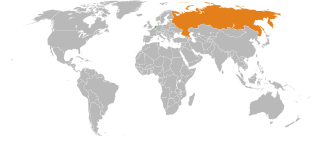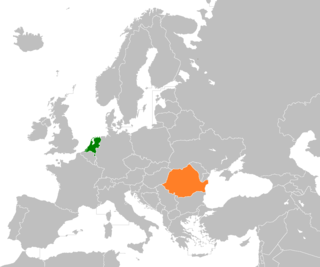
The foreign policy of the Netherlands is based on four basic commitments: to the Atlantic cooperation, to European integration, to international development and to international law. While historically the Kingdom of the Netherlands was a neutral state, since 1945 it has become a member of NATO, the United Nations, the European Union and many other international organizations. The Dutch economy is very open and relies on international trade. During and after the 17th century—its Golden Age—the Dutch built up a commercial and colonial empire. It was a leading shipping and naval power and was often at war with England, its main rival. Its main colonial holding was Indonesia, which fought for and achieved independence after 1945. The historical ties inherited from its colonial past still influence the foreign relations of the Netherlands. Foreign trade policy is handled by the European Union. The Dutch have been active in international peacekeeping roles.

Australia and Indonesia have established diplomatic relations since 1949, when Australia recognised Indonesia's independence. Historically, contact between Australians and Indonesians began as early as the 16th century prior to the arrival of the Europeans, through Makassan interactions with indigenous Australians on Australia's western and northern coasts.

Dutch Australians refers to Australians of Dutch ancestry. They form one of the largest groups of the Dutch diaspora outside Europe. At the 2021 census, 381,946 people nominated Dutch ancestry, representing 1.5% of the Australian population. At the 2021 census, there were 66,481 Australian residents who were born in the Netherlands.

Relations between the Netherlands and the United States are described as "excellent" by the United States Department of State and "close" by the Ministry of Foreign Affairs of the Netherlands. Official relations were established in 1782 and, as the two were never at war or in serious conflict, were referred to by U.S. President Ronald Reagan in 1982 as "the longest unbroken, peaceful relationship that we have had with any other nation." The two countries have cooperated much in recent decades in anti-terrorism, anti-piracy and peacekeeping missions in the European, Middle Eastern and Central American regions. They are also the third largest and largest direct foreign investors in each other's economies.

Foreign relations exist between Australia and Greece. Relations between the two states are close: the countries were allies during both World Wars and the Korean War. During World War II, Australian forces took part in the Battle of Greece and the Battle of Crete. There is a large Greek community in Australia. Each country has an embassy in the other's capital. Greece also has consulates general in Sydney, Melbourne and Adelaide, as well as a consulate in Perth, honorary consulates general in Brisbane and Darwin, and honorary consulates in Newcastle and Hobart. Both countries are full members of the Organisation for Economic Co-operation and Development.

Netherlands–Russia relations is the relationships between the two countries, the Kingdom of the Netherlands and The Russian Federation. Russia has an embassy in The Hague, and the Netherlands has an embassy in Moscow, a consulate in Saint Petersburg, and an honorary consulate in Yuzhno-Sakhalinsk.

Netherlands–Romania relations are the bilateral relations between the Netherlands and Romania. The Ambassador to Romania is concurrently accredited to Moldova. Romania has an embassy in The Hague and honorary consulates in Heeg, Rotterdam and Venlo. The Netherlands has an embassy in Bucharest, honorary consulates in Cluj-Napoca, Timișoara and Constanța, and since 2016 an office in Chișinău in Moldova.

Foreign relations exist between Australia and Estonia. Australia first recognised Estonia on 22 September 1921. Australia was among the first countries to re-recognise Estonia's independence on 27 August 1991. Both countries re-established diplomatic relations on 21 November 1991.

The Papua conflict is an ongoing conflict in Western New Guinea (Papua) between Indonesia and the Free Papua Movement. Subsequent to the withdrawal of the Dutch administration from the Netherlands New Guinea in 1962 and implementation of Indonesian administration in 1963, the Free Papua Movement has conducted a low-intensity guerrilla war against Indonesia through the targeting of its military, police, as well as civilian populations.

Indonesia and the Netherlands share a special relationship, embedded in their shared history of colonial interactions for centuries. It began during the spice trade as the Netherlands established the Dutch East Indies Company (VOC) trading post in what is now Indonesia, before colonising it as the Dutch East Indies until the mid-20th century. Indonesia was the largest former Dutch colony. In the early 21st century, the Dutch government has committed to boosting its relationship with Indonesia, noting that economic, political, and interpersonal contacts should be further strengthened.

The Netherlands–Pakistan relations refers to the bilateral, economic, cultural and historical relations between the Netherlands and Pakistan. The Netherlands maintains a permanent embassy in Islamabad and honorary consulates in Karachi and Lahore. Pakistan has an embassy in The Hague.

Indonesia and Suriname established diplomatic relations in 1975. Both had a special relationship, based upon shared common history as former colonies of the Dutch Empire. Large numbers of Javanese migrated to Suriname to work on plantations during the late 19th and early 20th-centuries. Indonesia has an embassy in Paramaribo also accredited to the Co-operative Republic of Guyana, while Suriname has an embassy in Jakarta. Indonesia and Suriname are members of the World Trade Organization (WTO) and Forum of East Asia-Latin America Cooperation.

The Netherlands-Indonesia Union, also called the two-state solution by the Dutch, was a confederal relationship between the Netherlands and Indonesia that existed between 1949 and 1956. Agreed in 1949, It was an attempt by the Netherlands to continue to bind its former colony of the Dutch East Indies to the Netherlands in a confederal manner, at least within the framework of a personal union, even after independence had been granted. However, it was less effective than the French Union of around the same time and less enduring than the British Commonwealth. The loose union failed primarily due to the dispute over Dutch New Guinea and was cancelled by Indonesia in 1954.

Mexico–Netherlands relations are the diplomatic relations between Mexico and the Netherlands. Both nations are members of the Organisation for Economic Co-operation and Development and the United Nations.

The Netherlands–Philippines relations refers to the bilateral relations between the Netherlands and the Philippines.

Netherlands – New Zealand relations is the official relationship between the Kingdom of the Netherlands and New Zealand. New Zealand has an embassy in The Hague and the Netherlands has an embassy in Wellington. The Ambassador to the Netherlands is concurrently accredited to Denmark, Finland, Iceland and Norway.

Foreign relations exist between Australia and Lithuania. Australia was among the first countries to re-recognise Lithuania's independence on 27 August 1991. Both countries formally established diplomatic relations on 6 November 1991. Australia is represented in Lithuania through its embassy in Warsaw, Poland and an honorary consulate in Vilnius. Lithuania has had an embassy in Canberra since 2021, and also has honorary consulates in Sydney, Adelaide, Melbourne and Darwin.























